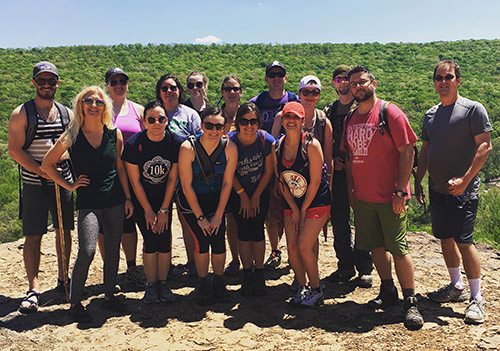Adventure Therapy Focus of New University of Arkansas Lab

U of A graduate students in counseling attended an introduction to adventure therapy event at Devil's Den State Park in April presented by professor David Christian and doctoral student Justin Cook.
The University of Arkansas has established the Adventure Therapy Lab in the College of Education and Health Professions with David Christian, an assistant professor of counselor education, as director.
Adventure therapy is an approach to group counseling that uses action and experiences to facilitate client growth. Activities range from hiking in the wilderness to games traditionally played in physical education classes.
"It is therapeutic growth of an individual through action," Christian explained. "The activity serves as a metaphor for what an individual is struggling with. They do an activity and then process it in terms of the metaphor."
Components of the new initiative will include research projects, experiential learning workshops, training on adventure therapy activities, an activity library and other resources. The students will use the activities and check out equipment from the lab during their internships and practicum experiences at local schools and other sites.
Christian took a group of counselor education students to Tulsa for a workshop with consultant Nate Folan last month to introduce them to adventure therapy. A group also attended an adventure therapy event put on by him and doctoral student Justin Cook in April at Devil's Den State Park.
The counselor education program at the University of Arkansas offers a Master of Science in counseling and a Doctor of Philosophy in counselor education.
Christian and some of his students are collaborating with a middle school in New Hampshire, where they are collecting data in a project that may be extended to a longitudinal study of the effects of adventure therapy on student behavior.
"We need to do research to help school districts see that adventure therapy works in helping adolescents with challenges they face," Christian said. "One of the greatest challenges with teens is effective communication, and adventure therapy helps with this in a fun and engaging way."
Christian plans to work with local schools to offer adventure therapy activities and to conduct other research projects.
He discovered adventure therapy when he previously worked as a special education teacher and found the curriculum of worksheets and PowerPoints was ineffective in teaching certain skills to groups such as emotionally disturbed boys.
Christian described a method known as the experiential learning cycle with the following steps:
-
Engage in the group activity.
-
What? Discuss what occurred during the activity.
-
So what? Why did we do this activity? How does it relate to real life struggles?
-
Now what? What can you do in real life with the knowledge learned about yourself?
Christian described one game in which the participants attempt to fill cups they are holding with as many alphabet blocks as possible while knocking other people's cups over so they lose blocks. Discussion following the activity might center on what an individual did most during the game - preserve his own collection of blocks or destroy others' collections. The game can be used as a metaphor for trust and show participants how to change the dynamics of a relationship by the actions they take, Christian said.
"Once during this activity, I went up to a participant who had knocked over my cup so that I could give him all of the blocks I had collected," he said. "His reaction to me approaching was to flinch away; he thought I was there to retaliate. He was surprised when I poured my blocks into his cup."
Participants can discuss several questions concerning this game, Christian said.
"How do you handle unexpected events?" he said. "Do people typically retaliate in certain situations? Can you change behavior?"
Contacts
Heidi Wells, director of communications
College of Education and Health Professions
479-575-3138, heidisw@uark.edu